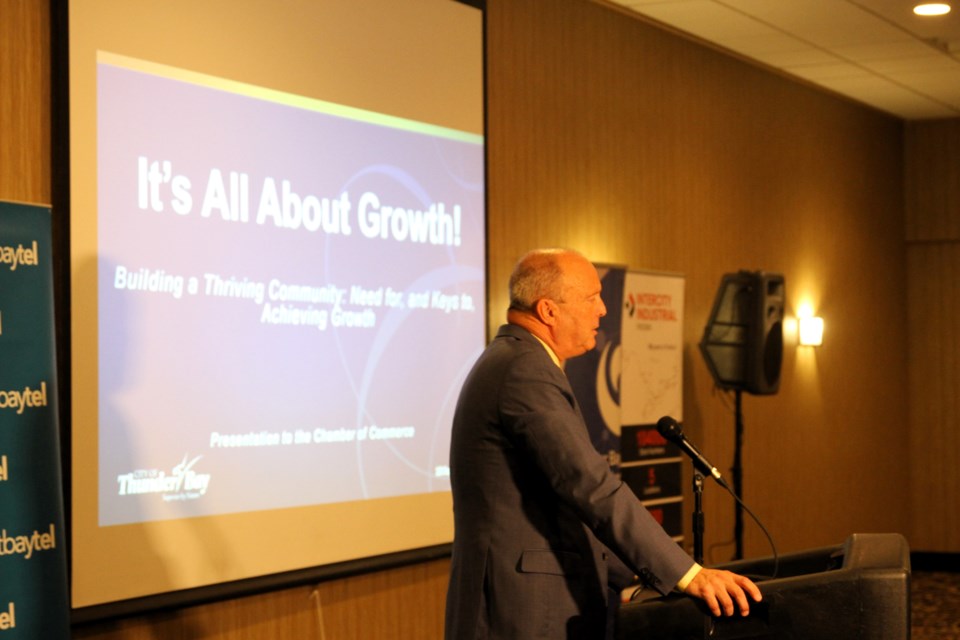THUNDER BAY - City manager John Collin addressed Thunder Bay’s growth at the Thunder Bay Chamber of Commerce leader’s luncheon on Wednesday.
The theme of the luncheon was Building a Thriving Community: Keys to Achieving Growth with City and Collin’s powerful presentation held tight to said theme.
Right off the bat, he pointed out that the city has an issue that must be addressed.
Collin said the city has not grown.
Using the censuses in 2016 and 2021, the estimated population growth for the city was 1.3 per cent. The province grew 5.8 per cent while western Ontario’s population grew five per cent over that same time frame.
Thunder Bay's population growth was four times less than the Ontario average.
“We are not growing our population and therefore do not have that mass of people that will help drive business. There's only one census metropolitan area in all of Canada that had worse growth than Thunder Bay during that time frame and that's Red Deer, Alta.,” Collin said.
Considering the economic stability of any corporate municipality is reliant on tax revenue to maintain services, a city in which its tax base has only grown 0.63 per cent over the last decade and remained constant at 0.4 per cent over the last five years is troubling.
Collin likens the city’s cumulative growth to compound interest where the city’s total growth has been 7.8 per cent Consumer Price Index (CPI).
This analogy becomes more important as he notes that inflation is around 32 per cent, however, that 32 per cent is based on household goods.
“Inflation in the municipality is much higher than that because our goods are different…It's not that we haven't grown enough to have extra money. We haven't grown enough to keep up,” Collin said.
“So, people wonder why we cut back on services, why we increase tax rates, why we increase user fees. It's out of necessity. But cutting back is never a recipe for growing, ever. And, that's why growth becomes such an important issue.”
It should be noted that at the start of his presentation, Collin added a disclaimer. He told the audience that what he was going to say was not the views of the city council.
He does not doubt that the statistics he presented will make their way to council in one way or another, but Collin expressively wanted the public to understand his presentation is based on his personal opinion on how to grow the city safely.
A major driving factor for Collin is getting the city back into a position of financial sustainability.
He did not mince words when he said the challenge is balancing the needs and wants of the community.
“Quite easily, I could justify at least a six per cent tax rate increase just from things that are asked for by the community and what council wishes to achieve,” Collin said.
“That kills households who are only getting maybe one to two per cent increases to their total income as a family unit, and it certainly kills business opportunity. So, we will not be moving forward, and we will not be able to satisfy everybody's needs because we will literally price ourselves out of business.”
According to Collin, the city has between $1.4 and $1.5 billion worth of infrastructure that is in poor or very poor condition.
“We've already discussed with council the fact that we think our deficit, our annual deficit, is about $31 million,” Collin said.
“We're not keeping up. We are falling behind $31 million a year. But we have at least $900 million of infrastructure that will need to be replaced or life extended somehow. That's a lot of money in the bank that needs to be addressed.”
To Collin, the city is not in a position to grow its population until there is a clear financial plan to meet the needs of its citizens. Once a plan is in place, the city and its stakeholders can successfully begin to market the viability of living in Thunder Bay.
“We can't accept that within the city limits, we're going to expand all of our infrastructure. We can't afford that. We need to think it through, but we need to have concrete actions within a concrete plan to address growth and it needs to be what I call a task force effort,” Collin said.
He wants to put together a think tank task force of academics and representatives of the business community to address this problem.
There is a clear mindset Collin is pushing. Although addressing the city’s infrastructure is mainly up to council, he illustrates that the wider business community can be involved in many avenues that cultivate positive solutions to grow the city.
He feels that the city as a whole needs a unified brand.
Collin stated that when he told people that he was moving to Thunder Bay and they responded why, he told them about the city's value.
“Because I can stand in the middle of Thunder Bay right down in the centre and by travelling 15 minutes in any direction, I can have any recreational activity I want from cross-country skiing to downhill skiing, to trailing to biking, to canoeing, to kayaking, to boating to every sport,” Collin said.
“From that same spot within 15 minutes, I can go from a symphony to a street concert. I can do fine dining or food trucks, and I can do it all with no lineups.
“I can afford the house that I live in and I have some money in my pocket for all those activities that I wanna do.
“Why can't we sell that?”
